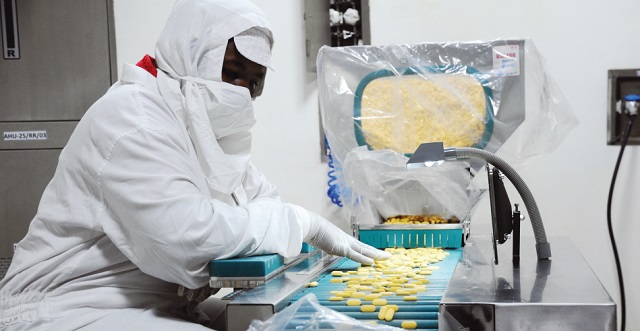
As African industrialisation progresses and Covid-19 impacts on long supply chains, the notion that African economies should produce more locally is gaining traction. Liam Taylor reports.
Every time a foreign dignitary visits Cipla Quality Chemical Industries Limited (CiplaQCIL), they plant a tree. Visiting presidents show up so frequently that the grassy verge outside its factory in Kampala will soon become a forest. The pharmaceuticals manufacturer is a feather in the cap of the Ugandan government: a sign that Africa need not rely on foreign imports to meet basic needs.
The Covid-19 pandemic has reinforced the notion that African countries should produce locally, rather than importing from abroad. Announcing a lockdown in March, Uganda’s President Yoweri Museveni expressed his hope that the crisis would help to build manufacturing capacity, rather than “turning our market into a dumping point for foreign goods”.
“Everything you have been importing, except for petroleum products, now make it here,” he exhorted.
Cipla, an Indian pharmaceutical company which holds a 51% stake in CiplaQCIL, used to import the drugs it sold in Uganda. In 2005 it entered into a partnership with Quality Chemicals Industries, its Ugandan distributor, and moved parts of the manufacturing process to Kampala. The active ingredients still come from India and China but the tablets are made and quality tested in Uganda, explains Nevin Bradford, CiplaQCIL’s chief executive. It sells drugs for HIV, malaria and hepatitis B to the Ugandan government, donor agencies and 19 African countries.
This kind of import substitution creates jobs, transfers skills and saves foreign exchange, as well as stirring patriotic pride. Bradford notes another advantage as Covid disrupts transport: security of supply.
“If anything, what Covid has done from our perspective is crystallise the minds of healthcare providers about security of supply,” says Bradford. “It’s only when they face the disruptions of logistics, of imports, of air freight, sea freight and all of that, that they really appreciate the benefit of having security of supply from an African-based manufacturer.”
That helps Uganda and Africa more widely, he says: “At the start of the Covid pandemic Botswana was facing a stockout of ARVs [antiretroviral drugs for people with HIV] because it couldn’t source them from its usual sources of supply in India. So we were able to step in and secure a contract worth over $6.5m to deliver 1m treatments of ARVs. And from a standing start we were able to do that in 10 weeks.”
Return to the past?
In the 18th century, US Founding Father Alexander Hamilton urged governments to erect tariff barriers to protect infant industries. In the 1950s, Latin American economists argued that import substitution would help developing countries break the grip of economic dependency.
Many African countries adopted this approach after independence, with some initial success. Between 1965 and 1970 manufacturing output grew annually by 8% in Ghana, and 10% in Tanzania, rates which have rarely been matched since.
But the boom didn’t last. African countries became more dependent on imports, in part because they still needed to buy intermediate and capital goods. Industrial enterprises were inefficient and badly run after being shielded from international competition. In the 1980s, as Africa lurched into a debt crisis, the IMF and World Bank pushed governments towards exports, privatisation and foreign direct investment.
In recent years import substitution has made a quiet comeback. Chinese growth and Trumpian protectionism are eroding the free-trade principles of the “Washington Consensus”, and slow industrialisation in Africa is reviving interest in alternative policies.
A degree of import substitution is happening anyway, stimulated by population growth and rising demand. Surveys of African industrial firms by the International Growth Centre, a research network at the London School of Economics, find that many started out as import-export businesses before venturing into domestic manufacturing. Half of the 50 leading industrial firms in Ethiopia in 2010 began as traders. A similar pattern holds for foreign companies in Africa. Chinese manufacturers in Africa make 93% of their revenues from local or regional sales, according to a 2017 McKinsey survey.
 The Independent Uganda: You get the Truth we Pay the Price
The Independent Uganda: You get the Truth we Pay the Price



